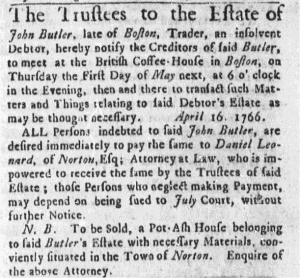GUEST CURATOR: Trevor Delp
What was advertised in a colonial newspaper 250 years ago this week?

“The Trustees of the Estate of John Butler.”
Today’s advertisement regards a legal notice alerting all colonists that John Butler died and his account was being settled. Colonial Americans struggled to settle estate cases, especially involving those that did not have a prewritten will. In an article discussing “English Law in American Land Research,” Sandra Hargreaves Luebking says, “The colonies lacked the judges, lawyers, law schools, and elaborate court system to implement English property law in all its complexity, but most of the basic concepts crossed the Atlantic and exist in the land records genealogists use.” The system brought to the colonies from Great Britain was very complicated and the average colonist lacked the knowledge to understand.
The advertisement began with a dated notice – April 16, 1766 – that asked “Creditors of said Butler, to meet at the British Coffee-House in Boston, … then and there to transact such Matters and Things relating to said Debtor’s Estate as may be thought necessary.” In the following paragraph it requests that all indebted to John Butler pay the same to Daniel Leonard, an attorney at law, who was handling the estate. It then goes onto threaten that those “who neglect making Payment, may depend on being sued to July Court, without further Notice.” This was something that I found unique to colonial advertisements and almost nonexistent in modern advertisements.
I was curious about how Butler and other debtors paid the money they owed. According to the Federal Reserve Bank of Philadelphia, in colonial America coins were the original primary form of currency, although they were not always in circulation. The first use of paper money was in “bills of credit.” These notes were redeemable in coin. One problem with these bills was that they led many colonists into debt that would be hard to repay. A project by Louis Jordan of Notre Dame states, “In 1749 the British government sent Massachusetts Bay Colony two tons of Spanish silver coins and ten tons of British coppers (primarily 1749 dated halfpence) as reimburse for assistance they provided to the Lewisburg expedition on Cape Breton Island, Nova Scotia, during the French and Indian War.” This shows that the Massachusetts Bay Colony was given a chance to start using silver as their main currency again. Furthermore, according to, Alvin Rabushka’s book, Taxation in Colonial America, “Under the 1749 Massachusetts Currency Reform, all debts and contracts from March 31, 1750, onward would be payable only in silver coin, and any court judgments brought for the recovery of debts would be converted into silver coin at the specified exchange rate for the different tenors.”
This leads me to believe that because Butler owned and ran his own shop with multiple forms of currencies with different exchange rates coming and going it would be easy to fall into debt and then struggle to escape it with the new act requiring only silver currency. The problem did not get any better once the colonies declared independence. According to the Federal Reserve Bank of Boston, during the Revolutionary War, the new nation issued too much money, causing inflation and by the end of the war the paper money was almost worthless. In the time leading up to the war the fluctuating value of money could explain why John Butler was in such debt. Furthermore, it would explain why he was not only in deb himself, but had customers who were in debt to him and expected to repay what they owe after his death.
**********
ADDITIONAL COMMENTARY: Carl Robert Keyes
Estate and probate notices were a common type of advertisement that appeared in colonial newspapers, often (depending on the newspaper) as frequently as advertisements for consumer goods and services. This sort of notice, complete with its stern language threatening further legal action, may seem unfamiliar to Trevor and other modern readers, but such notices were largely unremarkable alongside other advertisements in the colonial era.
Trevor has identified some of the reasons why it was easy for colonists to fall into debt. Certainly the lack of hard currency played a significant role. It also led to networks of credit: within cities and villages, throughout the colonies, and across the Atlantic. The consumer revolution of the eighteenth century occurred, in part, because merchants extended credit to retailers and, in turn, retailers extended credit to consumers. Appeals to price became a standard part of eighteenth-century advertisements, but they were often accompanied by specifications that retailers offered credit to tempt potential customers into making purchases (or sometimes explicitly stated that low prices could be had in exchange for cash, perhaps to avoid some of the problems raised in today’s advertisement).
The Economic History Association offers an overview of “Credit in the Colonial American Economy.”
